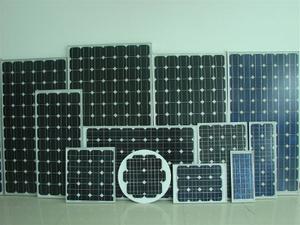China syndromePentagon prohibited from purchasing Chinese solar panels
Obama signs military appropriations bill that prohibits the Pentagon from purchasing Chinese solar panels; the “Buy American” provision is part of a larger trade dispute with China over subsidies; the Pentagon is investing heavily in solar to reduce its energy consumption and increase fighting effectiveness; the bill is likely to raise costs for the military

Made in U.S.A. sticker required // Source: electronicideas.com
Congress included a mandatory “Buy American” provision for solar panels in the latest military appropriations bill, signed by President Obama last Friday, that prohibits the Pentagon from purchasing Chinese solar panels.
The stipulation for the military comes as part of a broader ongoing trade dispute with China over alleged subsidies to its solar industry. The United States believes that China is unfairly subsidizing its clean energy industry and plans to file an official case with the World Trade Organization (WTO) against China.
The Obama administration is currently investigating whether China is violating WTO rules with export subsidies, local content requirements, and other rules. The United States has already filed a case with the WTO on Chinese wind turbine manufacturing subsidies and is determining whether or not to file additional cases.
The New York Times reports that China is the world’s largest producer of solar panels, accounting for more than half the world’s production. The United States has roughly 5 percent of the market or $1.6 billion of the $29 billion world market for solar panels.
Legislators were careful to ensure that the new law complied with the WTO’s free trade rules. In practice, this means that the Pentagon can only buy solar panels from countries that have signed the WTO’s agreement on government procurement which requires free trade in government purchases. Nearly every industrialized nation has signed the agreement, with the exception of China.
According to a report by the Center for a New American Security (CNAS), a Washington, D.C. based national security think tank, in recent years, the U.S. military has begun to purchase more solar panels and invest in renewable energy sources as it seeks “to reduce the military’s own climate-changing emissions and increase operational effectiveness.”
The Department of Defense (DOD) is the “largest consumer of fossil fuel in the world,” and in the short term it is “[improving] energy efficiency” as it is difficult, costly, and dangerous to supply troops with fuel in combat zones like Iraq and Afghanistan.
To improve its energy security, the DOD plans to reduce greenhouse gas emissions by 34 percent from non-combat activities by 2020. The reduction targets the department’s more than 300,000 domestic installations.
As a result, the Pentagon has begun investing heavily in solar technology. The military currently operates the largest solar array in North America at Nellis Air Force Base in Nevada, generating about fourteen megawatts of energy. Plans to expand on its solar farms include a 3,200 acre solar power project at Edwards Air Force Base, a 500 megawatt solar power plant at Fort Irwin, and a thirty acre solar farm at Fort Bliss Army Base.
Costs for the military’s solar procurements could go up in the short term as a result of the new legislation. According to Ocean Yuan, the chief executive and president of Grape Solar, a company that distributes solar panels, imported solar panels are generally 20 percent cheaper than their American equivalents.
Will Rogers, a national security and climate change researcher at CNAS, believes that this ban would likely have little effect on military solar projects in the long run.
He said, “The solar industry in the United States is continuing to grow, and as it does, we’re seeing greater investments to improve existing and develop better photovoltaic technology that is more efficient, has a higher energy output, and stores more.”
Rather than focus on cost, Rogers believes the DOD’s top priorities will be on “finding the technology that maximizes their investment, helps them achieve their energy security goals, and ultimately their mission effectiveness.”
The “Buy American” provision is likely to rankle China especially as President Hu Jintao prepares for his visit to the United States next week.
